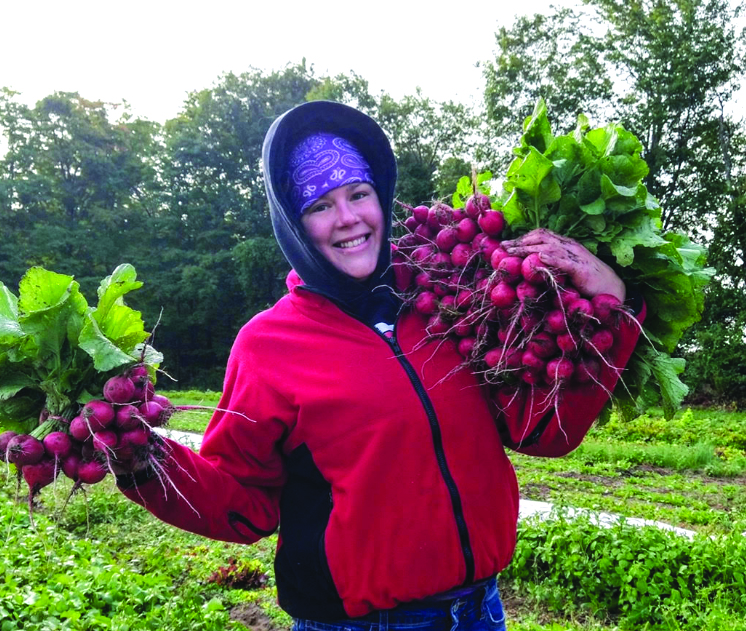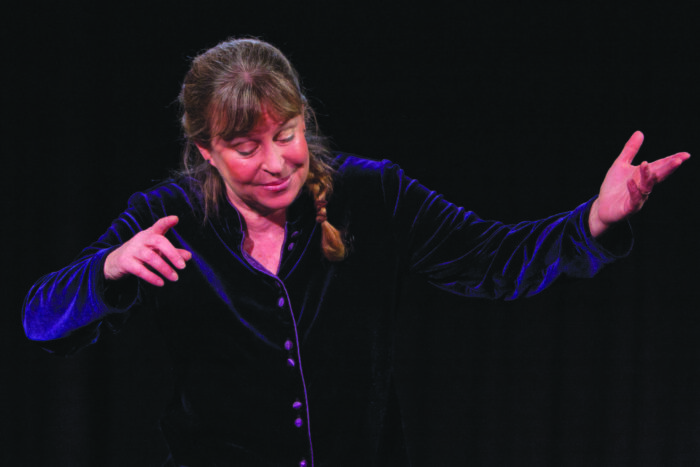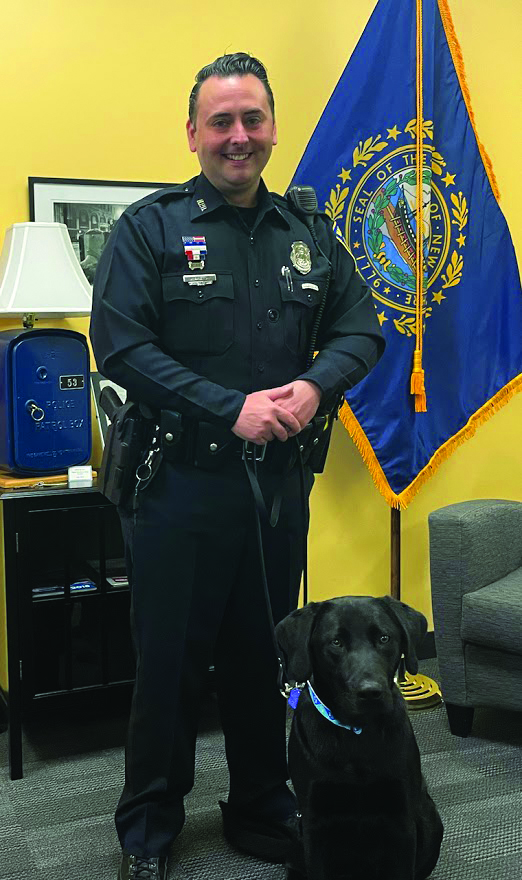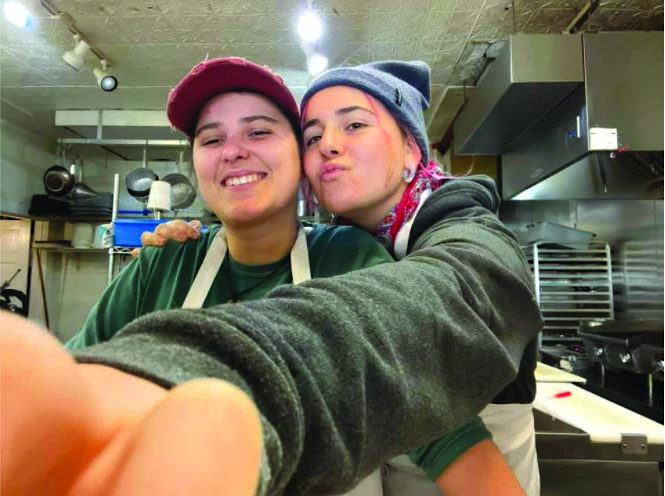Storytelling Festival features traditional and personal stories, poetry, music
The New Hampshire Theatre Project’s annual Storytelling Festival returns to the stage — and to the screen — on Saturday, April 10, with six storytellers telling traditional and personal tales inspired by the theme “What Are You Waiting For?” The performance will be held for a live audience in person at The Music Hall in Portsmouth and virtually over the live video platform Crowdcast.
“There are several [storytelling series] in the area that honor personal stories in the Moth [Radio Hour] tradition, but in terms of telling different kinds of stories, telling traditional tales and [highlighting] storytelling as an art form, there’s really nothing else like [NHTP’s Storytelling Festival] in the area,” said NHTP executive director Genevieve Aichele, who is hosting and performing at this year’s event.
Featured storytellers will include Boston-based award-winning storyteller Diane Edgecomb, presenting a comedic story from her early acting career; British storyteller and humorist Simon Brooks, performing a traditional tale from northern England; Seacoast jazz musician and entertainer Sharon Jones, sharing a story about a special moment on stage at Portsmouth High School; Seacoast storyteller and emcee Pat Spalding of the storytelling series True Tales Live, aired on Portsmouth Public Media TV, telling tales of her time as a majorette with the Leftist Marching Band; and poet Maya Williams of Portland, Maine, telling stories of suicidality, racial identity, religion and healing through the art of spoken word poetry.
Additionally, world fusion musician Randy Armstrong will perform musical interludes throughout the festival with an eclectic mix of instruments.
“If you like Moth Radio Hour and you want to hear those types of personal stories, there will be some of that, and if you enjoy traditional tales, there will be some of that, too,” Aichele said. “Poetry, music — there’s something in it for everyone.”
Aichele will perform her original adaptation of “The Elephant and the Ant,” a traditional tale from India, with musical accompaniment by Armstrong.
“The music is really part of the storytelling,” she said. “It helps to set the mood and gives it that cultural atmosphere and flavor of the culture where the story begins.”
The theme “What Are You Waiting For?” was inspired, Aichele said, by the innovation of the arts community throughout the pandemic.
“It’s a new world; we can’t do art the way we used to,” she said, “so why not use Covid as an opportunity to reinvent ourselves? What are we waiting for? That’s really what these stories are about — not waiting to act or make a change.”
While experiencing a performance virtually is “not quite the same” as experiencing it in person, Aichele said, there’s still a “feeling of excitement and energy” that comes with watching any kind of live event.
“No matter where you are, you’re there; you’re in the audience,” she said. “You’re a part of that community of people who are seeing this thing happening live, and that can be really exciting.”
New Hampshire Theatre Project’s 5th annual Storytelling Festival
Where: Live in person at The Music Hall Historic Theater, 28 Chestnut St., Portsmouth, and virtual livestream via Crowdcast
When: Saturday, April 10, 8 p.m.
Cost: Tickets cost $36 for the performance at The Music Hall and $15 for the livestream performance
More info: Visit nhtheatreproject.org and themusichall.org
Art
Call for Art
• FIBER ART EXHIBIT The Surface Design Association’s (SDA) New Hampshire Group invites New Hampshire fiber artists to submit work for its upcoming exhibit of fiber art and textiles, “Tension: Process in the Making.” Exhibit will run July 24 through Sept. 4 at Twiggs Gallery (254 King St., Boscawen). Submission deadline is Fri., May 1. Visit twiggsgallery.wordpress.com or call 975-0015.
Classes & lectures
• GENERAL ART CLASSES In-person art classes for all levels and two-dimensional media. held with small groups of two to five students. Private classes are also available. Diane Crespo Fine Art Gallery (32 Hanover St., Manchester). Students are asked to wear masks in the gallery. Tuition costs $20 per group class and $28 per private class, with payment due at the beginning of the class. Call 493-1677 or visit dianecrespofineart.com for availability.
• DRAWING & PAINTING CLASSES Art House Studios, 66 Hanover St., Suite 202, Manchester. Classes include Drawing Fundamentals, Painting in Acrylic, Drawing: Observation to Abstraction, Exploring Mixed Media, and Figure Drawing. Class sizes are limited to six students. Visit arthousestudios.org.
Exhibits
• “BODY OF WORK: SERIES I” New Hampshire Art Association presents an exhibition featuring artwork in a variety of media by eight local artists. On view now through May 2. Online and in person at the NHAA’s Robert Lincoln Levy Gallery, 136 State St., Portsmouth. All works are for sale. Gallery hours are Monday and Tuesday by appointment, Wednesday and Thursday from 11 a.m. to 5 p.m., Friday and Saturday from 11 a.m. to 6 p.m., and Sunday from noon to 5 p.m. Visit nhartassociation.org or call 431-4230.
• 35TH ANNUAL OMER T. LASSONDE JURIED EXHIBITION The New Hampshire Art Association presents a group art show featuring works in a variety of media by NHAA members and non-members. NHAA’s Robert Lincoln Levy Gallery (136 State St., Portsmouth). On view now through May 30. A virtual opening reception and awards ceremony is planned for Thurs., April 15, at 6:30 p.m. Call 431-4230 and visit nhartassociation.org.
• “THE BODY IN ART: FROM THE SPIRITUAL TO THE SENSUAL” Exhibit provides a look at how artists through the ages have used the human body as a means of creative expression. On view now through Sept. 1. Currier Museum of Art, 150 Ash St., Manchester. Museum admission tickets cost $15, $13 for seniors age 65 and up, and must be booked online. Call 669-6144 or visit currier.org.
• GALLERY ART A new collection of art by more than 20 area artists on display now in-person and online. Creative Ventures Gallery (411 Nashua St., Milford). Call 672-2500 or visit creativeventuresfineart.com.
• “TOMIE DEPAOLA AT THE CURRIER” Exhibition celebrates the illustrator’s life and legacy through a collection of his original drawings. On view now. Currier Museum of Art, 150 Ash St., Manchester. Museum admission tickets cost $15, $13 for seniors age 65 and up, and must be booked online. Call 669-6144 or visit currier.org.
Special events
• MAGNIFY VOICES EXPRESSIVE ARTS CELEBRATION Youth artwork showcased to help raise awareness and decrease stigma of mental illness and effect change to ensure social and emotional health for all children in New Hampshire. May, date TBA. Visit tinyurl.com/magnifyvoices2021 or email [email protected].
Theater
Shows
• THE SORCERER’S APPRENTICE Filmed live in London 2021. Virtual screening presented by Capitol Center for the Arts in Concord. Now through April 11. $25 per ticket. Call 225-1111 or visit ccanh.com.
• DON QUIXOTE Performed by Safe Haven Ballet. Thurs., April 8, and Fri., April 9, 7 p.m. The Music Hall, Historic Theater, 28 Chestnut St., Portsmouth. Tickets cost $50 for adults and $45 for children, seniors and groups. Visit themusichall.org or call 436-2400.
• THE ART OF CIRCUS Virtual screening presented by Capitol Center for the Arts in Concord. Thurs., April 8, 7 p.m., Sat., April 10, 8 p.m., and Sun., April 11, 2 p.m. $25 per ticket. Call 225-1111 or visit ccanh.com.
• FIFTH ANNUAL STORYTELLING FESTIVAL New Hampshire Theatre Project presents. Five storytellers tell traditional and personal tales inspired by NHTP’s 2020 – 2021 MainStage theme “What Are You Waiting For?” Featuring Diane Edgecomb, Pat Spalding, Simon Brooks, Sharon Jones and Maya Williams; with special guest host Genevieve Aichele and musical accompaniment by Randy Armstrong. Sat., April 10, 7 p.m. The Music Hall Historic Theater, 28 Chestnut St., Portsmouth. Tickets cost $36. Call 431-6644 or visit nhtheatreproject.org.
• KINKY BOOTS Recorded live in London. Virtual screening presented by Capitol Center for the Arts in Concord. April 14 through April 21. $15 per ticket. Call 225-1111 or visit ccanh.com.
• COX AND BOX Performed by New York Gilbert & Sullivan Players. Virtual screening presented by Capitol Center for the Arts in Concord. Thurs., April 15, and Fri., April 16, 8 p.m., and Sun., April 18, 2 p.m. $20 per ticket. Call 225-1111 or visit ccanh.com.
• ZOOM PLAY FESTIVAL Presented by Powerhouse Theatre Collaborative and Community Players of Concord. Features short original plays by New Hampshire playwrights. Fri., April 16. Virtual. See Powerhouse Theatre Collaborative on Facebook.
• THAT GOLDEN GIRLS SHOW: A PUPPET PARODY at the Capitol Center for the Arts (44 S. Main St. in Concord; ccanh.com) on Sat., April 24, at 8 p.m. Tickets cost $35.
Classical
• CONCORD COMMUNITY MUSIC SCHOOL FACULTY CONCERT Part of Concord’s Walker Lecture Series. Virtual, via Concord TV (Channel 22, or stream at yourconcordtv.org). Wed., April 21. 7:30 p.m. Free and open to the public. Call 333-0035 or visit walkerlecture.org.
Featured photo: Featured storyteller Diane Edgecomb. Courtesy photo.






